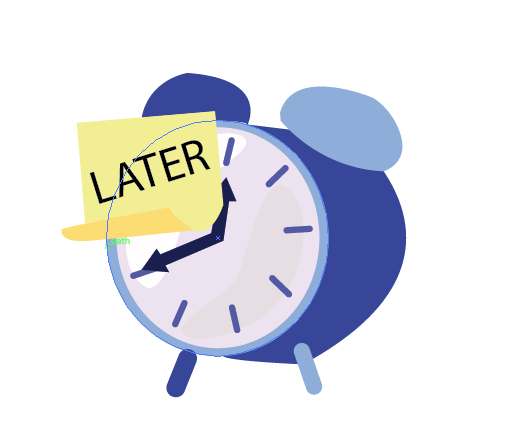
Students often procrastinate and while their peers may think they are lazy or simply don’t care about their studies, research suggests that laziness or lack of caring may not be the key causes of procrastination.
Procrastination is the act or habit of putting off or delaying a task, especially something requiring immediate attention.
Scientists still do not know its origin but studies suggest the answer could be found in the way the different parts of our the brains are connected and how neurons communicate with one another.
The study referenced, here, is that of Dr. Nazima Pathan, a British doctor with qualifications in Medicine from the University of London (St Bartholomew’s Hospital Medical School) and is based on a survey and scans of 264 people’s brains to measure how active they were.
Dr. Pathan published her research into procrastination and the personality traits related to it, “Procrastination: It’s pretty much all in the mind”, in the BBC online on Aug. 26, 2018 and, through her work, we gain some important insight into this ubiquitous personality flaw.
The experts came to a surprising conclusion: procrastination is more about managing emotions than time.
Researchers at Ruhr-Universität Bochum analyzed the reasons behind the tendency to put tasks off rather than tackling them directly. Using magnetic resonance imaging (MRI), they identified two brain areas whose volume and functional connectivity are linked to an individual’s ability to control their actions: the amygdala and the dorsal anterior cingulate complex (DACC).
The amygdala has a primary role in the processing of emotions. “The DACC uses information from the amygdala and decides what action the body will take. It helps keep the person on track by blocking out competing emotions and distractions,” explains Dr. Pathan.
A correlation between the size of the amygdala and the tendency to procrastinate has been witnessed: procrastinators seem to have a larger amygdala than doers.
This means their brain generates more emotions, and particularly negative emotions. This causes anxiety, so the individual will tend to hesitate and delay tasks.
Moreover, the connection between the amygdala and the DACC appears weaker in a procrastinator’s brain.
This weak connection would induce a less efficient regulation of distractions and the amplification of anxiety (because the brain does not offset the abnormal amount of negative emotions).
How, then, do procrastinators differ from non-procrastinators?
“Non-procrastinators focus on the task that needs to be done. They have a stronger personal identity and are less concerned about what psychologists call ‘social esteem’—how others appreciate us—as opposed to self-esteem which is how we feel about ourselves” exposed Dr. Ferrari in an interview with the American Psychological Association.
They appear to have strong self-discipline, persistence, and personal responsibility.
Sometimes, unseen problems or circumstances compel students delay in their academic work.
To assess the amount of procrastination among this section of the population, a small survey about procrastination habits was made at the university, questioning the reasons and frequency of procrastination, as well as its impact on the respondents.
Each participant had put something off at least once, and most are regular procrastinators. But laziness represents less than a quarter of the reasons why.
A lot of different causes induce this habit: lack of time or energy, difficulties in focusing (and the adrenaline produced when working under pressure can help to focus), or even a fear of the task, of failure, testifying to a lack of self-confidence.
To conclude, procrastination affects a too-large percentage of the population to justify continued ignorance of its root causes.
It is clear that there are more complex psychological processes at work than mere ‘laziness’.
Whilst true that some people work better under pressure due to the adrenaline that comes in right before a hard deadline which sharpens focus, procrastinating results in highly stressful situations.
Procrastination can be your best friend, but it is the kind of friend you will be better off cutting out of your life.




























